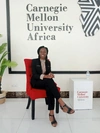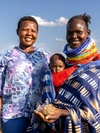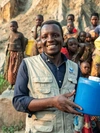Dorcus Maloney
Championing Girls’ Education in South Sudan

Tales of Courage is a series that speaks about the power of education as a tool for transformative change in the world. They are told through the lens of Mastercard Foundation Scholars and Alumni. Here is Dorcus’s story.
Growing up in Bor town, South Sudan, but residing primarily in Nyumanzi refugee camp in Uganda, Dorcus knew little about life outside the refugee camp.
Her mother fled to Nyumanzi in 1991 as a young girl, grew up and thereafter married in the camp. After Dorcus’s parents divorced she was left in her grandmother’s care, pursuing much of her education at the refugee camp. After her seventh year of primary school, she received a scholarship to continue her education. She also spent her time as a volunteer teacher at a primary school. Since the outbreak of war in South Sudan in 2014, Dorcus has called the refugee camp her home.
It was during her time as a volunteer teacher that Dorcus heard about African Leadership University. She applied for and was accepted into the Mastercard Foundation Scholars Program at the Africa Leadership University, Rwanda (ALU-Rwanda).
Today, Dorcus is an advocate for girls’ education. She is of the view that it isn’t given as much attention as that of boys and so she helps remedy it by helping young people, especially young women, in her community apply for the Mastercard Foundation Scholars Program. She does this through the South Sudan Youth Leadership Scholars Network Program (SSYLNET), an initiative founded by Latjor Dak, a Mastercard Foundation Scholar at ALU-Rwanda, that supports young South Sudanese to obtain scholarship opportunities for further studies.
Next on the agenda for Dorcus and her fellow Mastercard Foundation Scholars is organizing an event to share tips with young people on how to apply to the African Leadership University. A major obstacle Dorcus and her fellow Mastercard Foundation Scholars identified is the high cost of English tests, which can be a financial barrier for prospective applicants. She seeks to remedy issues such as these through her work with Dak. She also suggests that schools support students offered scholarships by paying for English tests.
Dorcus is optimistic about the future and would like to see refugees like herself work more closely together and support each other.





